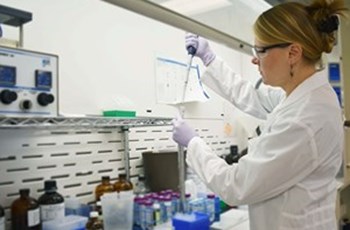
Quality testing is a vital component of a physician's evaluation of a patient with a view to successful treatment. But how can health care providers ensure that the lab they are working with is giving them the quality they need?
We’re often asked "Why should I partner with your lab? What distinguishes you from the others?" While many providers are expecting the obvious answers like fair prices and fast, reliable results – which are definitely important – we like to dig a bit deeper than this.
At ZRT Laboratory, we think there are six important measures to help determine the quality of a lab.
1. Certification
CLIA (Clinical Laboratory Improvement Amendments) certification is one important criterion that ensures a lab conforms to federal regulations regarding testing. ZRT is a CLIA-certified laboratory and is subject to regular inspections of all aspects of the lab's procedures to ensure ongoing compliance. This, in turn, assures health care providers that the lab is adhering to proper scientific procedures.
2. Assay Validation
Federal regulations governing assay validation are specified in the CLIA standards for quality assurance. This validation includes rigorous criteria for assay precision, accuracy, and sensitivity, and an important aspect of assay validation is to establish a reference range of expected values in a population that is as healthy as possible.
Tests developed by ZRT undergo a comprehensive assay validation procedure before they can be used commercially. The regulations require that reference ranges are provided with test reports so that providers can see if their patients' results are within or outside that range and make treatment determinations accordingly.
Related Reading: How Reference Ranges Determine a "Normal" Lab Test Result
3. Research Involvement
Labs that are highly respected are often involved in research studies into various aspects of health. Researchers have to rely on accurate and reliable testing, and labs involved in research need to meet stricter criteria in order to be approved by the funding sources for research studies, such as the National Institutes of Health (NIH). ZRT has partnered with NIH-funded research groups and universities around the world as well as the Centers for Disease Control, to provide test results that can ultimately contribute to advances in medical science.
Key Fact: ZRT is the only specialty hormone laboratory to have qualified for the CDC’s Hormone Standardization Program (HoSt) – meaning that ZRT has successfully passed the performance criteria to qualify for the CDC Testosterone Reference Method and the CDC Estradiol Reference Method
4. Conflicts of Interest
Another consideration when assessing the quality of a lab's results is whether the lab sells supplements or other treatments for conditions identified by its own testing. While this may seem obvious, it can be a serious pitfall – as at least one prominent lab has recently been found guilty of doing just that.
Over its nearly 20 year history, ZRT has never sold anything except lab results. This keeps our focus on accurate testing and avoids any conflicts of interest that could arise by publishing reference ranges that are too narrow, resulting in test reports that might identify too many patients as having an abnormal result. Since we have no vested interest in potential treatments for imbalances, such as supplements, we identify results as abnormal only when they fall outside our established reference ranges that are based on a healthy population.
5. Clinical Support
Testing labs usually assist physicians with interpretation of patients' results in some way. A detailed test report, giving not only the reference ranges and a determination of whether results are within or outside those ranges, but also some pertinent information to help with clinical interpretation of abnormal results is something to look for in a lab partner.
ZRT's test reports, along with our comprehensive provider resources, are highly detailed and include citations of relevant clinical studies to support the information presented. To allow fast turnaround times, results are interpreted with the help of an "artificial intelligence" system so that they can be categorized appropriately in the test report, which is then reviewed and approved by our clinical consultant team before being finalized. Clinical consultants are available by telephone to provide additional assistance.
6. Industry Standards
A commitment to excellence is something that patients and health care providers should expect from their lab of choice. |
A desire to meet and exceed standards set by the industry is another measure of lab quality. A commitment to excellence is something that patients and health care providers should expect from their lab of choice.
Proficiency testing is a big part of ongoing quality control, and ZRT participates in proficiency testing programs relevant to the analytes we test. These include the College of American Pathologists (CAP), DEQAS (the Vitamin D External Quality Assessment Scheme), EQUIP (Ensuring the Quality of Urinary Iodine Procedures), and LAMP (the CDC’s Lead and Multi-Element Proficiency program). Within the saliva testing industry, since no external organization prepares saliva samples for proficiency testing, ZRT took the step of establishing the Saliva Proficiency Inter-Laboratory Testing (SPIT) program in an effort to maintain quality in saliva hormone testing.
With the prevalence of specialty labs today, health care providers are fortunate to have a choice for quality testing services. Never settle for a lab in which you don’t have absolute confidence, and don’t be afraid to ask about qualifications. Any lab you choose should be glad to have a conversation about these six characteristics of quality.
In fact, if you have any additional questions about ZRT's quality standards, we’ll gladly answer them.
